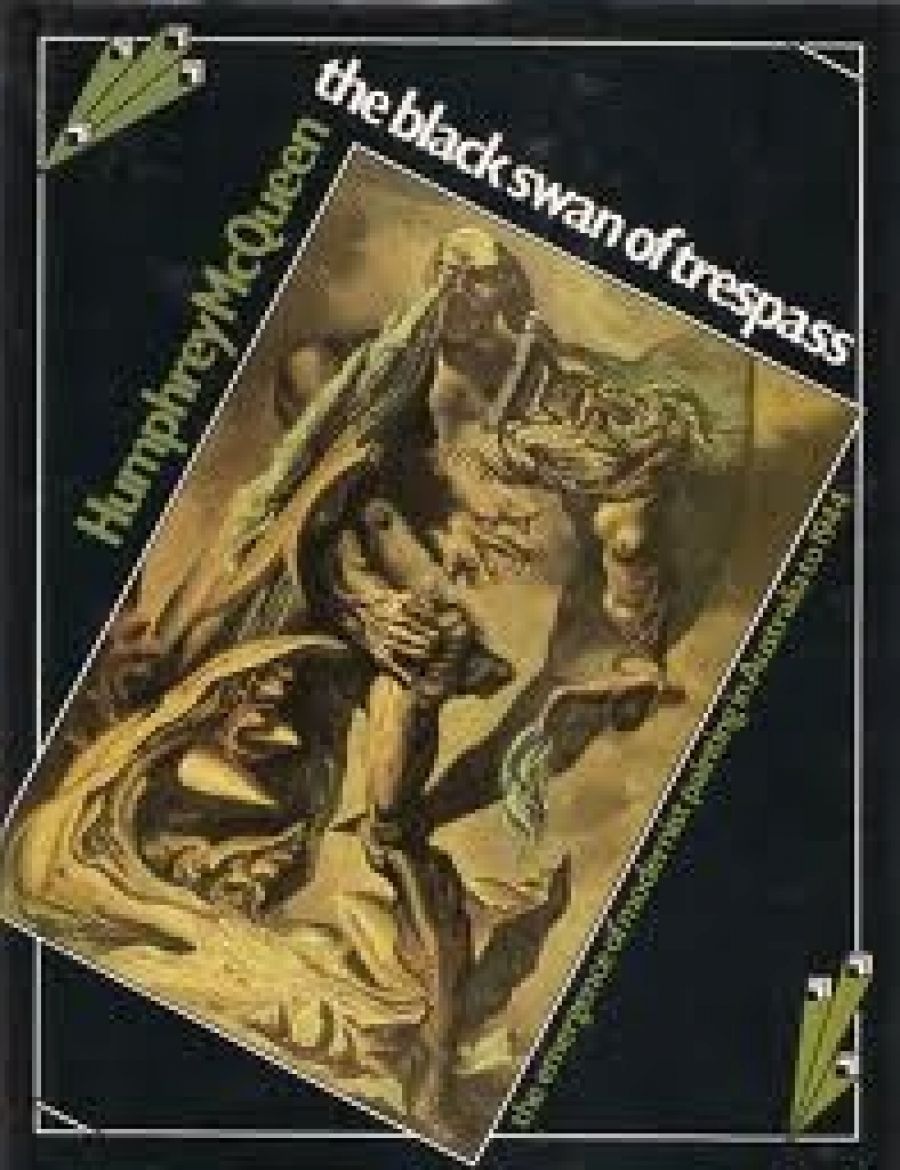
- Free Article: No
- Contents Category: Art
- Custom Article Title: T. Counihan reviews 'The Black Swan of Trespass' by Humphrey McQueen
- Review Article: Yes
- Article Title: Through a glass redly
- Online Only: No
- Custom Highlight Text:
Humphrey McQueen’s new book claims to give an adequate account of the emergence if not the development of modernist paining in Australia up to 1944. In particular he claims to do two things the previous writers in this area have not done or have done inadequately.
- Book 1 Title: The Black Swan of Trespass
- Book 1 Subtitle: The emergence of modernist paining in Australia to 1944
- Book 1 Biblio: Alternative Publishing Cooperative, 178 pp., biblio., $14. 95
Secondly, he measures the putative modernity (traditionalism is only a foil to the latter) of this or that painter in terms of their response (art does not initiate) to one of the three main elements of the physical sciences, Marxism v Leninism and psychoanalysis. Reaction to progressive intellectual elements is McQueen’s test, and functions as an analogue to more conventional notions of class position, or if you like, virtue by association. McQueen, partly through ignorance (he does not discuss the books listed in the first section of his bibliography), partly through a shrewd eye for the unacceptable consequence, steers well away from the Marxism he otherwise advocates as the emblem of modernity. It only really appears as a singularly schematic form of periodisation. There is no discussion of the art market and a singular lack of attention to the discrepancies in income and material circumstance of the painters he is supposed to be concerned with.
Armed with his ‘problematic’ of modernism and with an anachronistically nationalistic view of Australian culture, McQueen goes fossicking about a variety of political and cultural events and personalities of the intervening period, dispersing opiniated asides and heavy-handed judgments in a way that makes more serious art historians look like intellectual monuments to curiosity and analytic veracity by comparison. McQueen presents his silly comments as authoritative judgements which do not require arguments to support them. To demonstrate this, let alone his utter confusion about his subject matter and the tradition he claims to be a member of, would take considerably more space than is available.
Consider his judgement that Margaret Preston’s landscapes – banksias, wattles, and so on – are virtually the incarnation of modernism during his period. This conclusion appears to be arrived at by a process of subtraction. Eliminate those left-wing artists associated with the Communist Party (for retrospective political reasons to do with a Sinophile version of Australian Nationalism) and then the better known commercially accepted artists advocated by the other critics, and who do you have left? Margaret Preston was an ardent believer in a nationalist Australian art and a woman interested in Asia. She seems tailor-made for McQueen’s title of cultural heroine of Australian Art, a successor to Blinky Bill. If Margaret Preston is in advance the embodiment of Australian Modernism, then the category ‘modernism’ must be reworked in a circular fashion to fit Margaret Preston’s role and preferences. And so it goes.
Considering that McQueen’s reputation has been as a historian, the lack of curiosity and attention to the history of the period in this book is nothing short of astonishing. Although he touches on many subjects, he treats none in depth, not even those two politically resonant events, the Archibald prize lawsuit of over Dobell’s Joshua Smith’s portrait and the Ern Malley hoax. Presumably. McQueen is not interested in these because he assumes he knows their significance in advance. He presents himself as the Max Harris of the Australian New Left, full of empty opinionated summary verdicts and pointless controversies.
It is a pity that the Alternative Publishing Co-op should begin its career with such a badly presented. dreadfully written and inconsequential book.


Comments powered by CComment